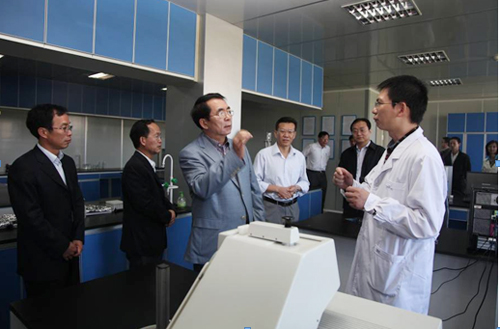| News |
| Latest news | |
| Int’l Cooperation activities | |
| Events & Announcement | |
| Recent Activities |
| Location: Home>News>Recent Activities |
| CAS President BAI Chunli visits Tibet |
During August 14-19, 2012, CAS President BAI Chunli went to the Tibet Autonomous Region (TAR) and inspected ITP’s Lhasa campus. He listened to the work report by ITP director YAO Tandong in further promoting ITP research in the upcoming five years, and visited the Lhasa campuses of both the key laboratory of Tibetan Environment changes and land surface processes (TEL) and of Continental Collision and Plateau Uplift (LCPU). He also visited various field sites in Tibet, including ITP field stations on the Plateau such as SETORS and QOMORS, apart from IGSNRR Integrated stations for Alpine ecology at Lhasa and three sites susceptible to geological hazards at Zhangmu, Xigazi.
In guiding ITP’s further development, President Bai asked ITP to conduct its research revolving around the Plateau uplift and its influences on climate and environment in Asia and the northern Hemisphere. He encouraged ITP scientists to contribute more thinking to Tibetan Plateau research innovation, and take an active role in international cooperative study of the Tibetan Plateau environment. How to better serve for regional sustainability with science was one of the major concerns during President Bai’s visit. He asked ITP to collaborate with other research institutes within CAS to identify the needs of the local government in Tibet, and to pay special attention to environmental hazards mitigation and ecology protection. He highlighted the principal of CAS in helping promote the development of Tibet, which is “to provide knowledge, talents and scientific techniques”. While inspecting field stations, President Bai expressed his respect and approval to those staff working at remote areas on the Plateau. He emphasized the need to apply academic achievement, attract talents and deliver some thoughts to upgrade the field stations to the national level. “Advantageous research force within CAS should be integrated and a team of high-level researchers should be cultivated to help realize a sustainable development of science in Tibet.” He said.
Among the CAS delegate to Tibet were CAS secretary-general, deputy secretary-general, head of the CAS Bureau of Science and Technology for Resource and Environment, and directors of ITPCAS, IGSNRR and IMHD. The visit of the delegate to Tibet was welcomed by TAR high-level officials. |


